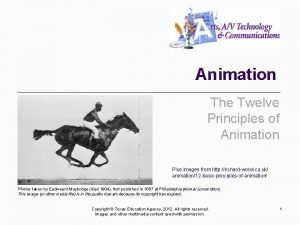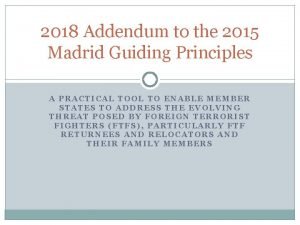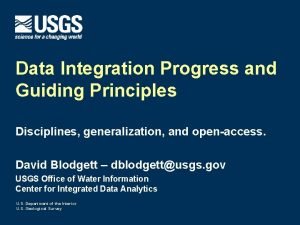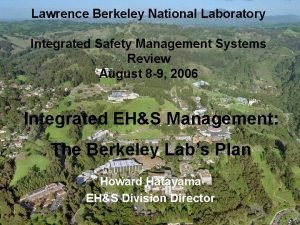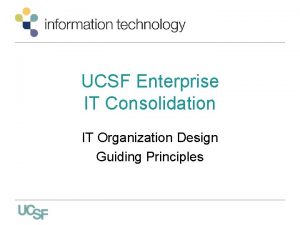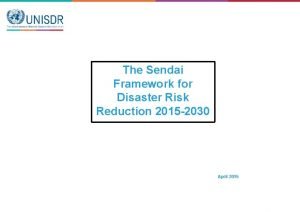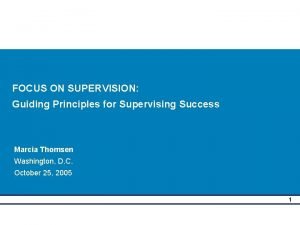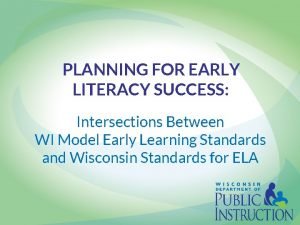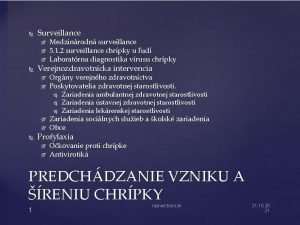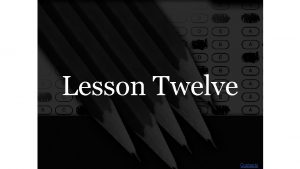Twelve Guiding Principles for the Regulation of Surveillance

















- Slides: 17

Twelve Guiding Principles for the Regulation of Surveillance Camera Systems Presented by: Alastair Thomas Date: 23 rd October 2013

Challenging context • • • Different sectors Different purposes Different technologies Technology and professional practice evolve Regulatory burdens to be minimised 2

Protection of Freedoms Act 2012 • Code of practice as guidance • 12 Guiding Principles • Developed from report on police use of ANPR 3

12 Guiding Principles 1 to 4: - development and use of camera systems Guiding Principles 5 to 12: - use and processing of images and information 4

Guiding Principle 1 Use of a surveillance camera system must always be for a specified purpose which is in pursuit of a legitimate aim and necessary to meet an identified pressing need. 5

Guiding Principle 2 The use of a surveillance camera system must take into account its effect on individuals and their privacy, with regular reviews to ensure its use remains justified. 6

Guiding Principle 3 There must be as much transparency in the use of a surveillance camera system as possible, including a published contact point for access to information and complaints. 7

Guiding Principle 4 There must be clear responsibility and accountability for all surveillance camera system activities including images and information collected, held and used. 8

Guiding Principle 5 Clear rules, policies and procedures must be in place before a surveillance camera system is used, and these must be communicated to all who need to comply with them. 9

Guiding Principle 6 No more images and information should be stored than that which is strictly required for the stated purpose of a surveillance camera system, and such images and information should be deleted once their purposes have been discharged. 10

Guiding Principle 7 Access to retained images and information should be restricted and there must be clearly defined rules on who can gain access and for what purpose such access is granted; the disclosure of images and information should only take place when it is necessary for such a purpose or for law enforcement purposes. 11

Guiding Principle 8 Surveillance camera system operators should consider any approved operational, technical and competency standards relevant to a system and its purpose and work to meet and maintain those standards. 12

Guiding Principle 9 Surveillance camera system images and information should be subject to appropriate security measures to safeguard against unauthorised access and use. 13

Guiding Principle 10 There should be effective review and audit mechanisms to ensure legal requirements, policies and standards are complied with in practice, and regular reports should be published. 14

Guiding Principle 11 When the use of a surveillance camera system is in pursuit of a legitimate aim, and there is a pressing need for its use, it should then be used in the most effective way to support public safety and law enforcement with the aim of processing images and information of evidential value. 15

Guiding Principle 12 Any information used to support a surveillance camera system which compares against a reference database for matching purposes should be accurate and kept up to date. 16

Questions? 17
 Tongue twisters in english
Tongue twisters in english Slow in slow out animation
Slow in slow out animation 12 principles of green chemistry with examples
12 principles of green chemistry with examples Architecture
Architecture Introduction of ncf 2005
Introduction of ncf 2005 Madrid guiding principles
Madrid guiding principles Integration guiding principles
Integration guiding principles Guiding principles for dual language education
Guiding principles for dual language education Guiding principles of mtb-mle
Guiding principles of mtb-mle Isms guiding principles
Isms guiding principles Org design guiding principles
Org design guiding principles Sendai framework guiding principles
Sendai framework guiding principles Guiding principles of supervision
Guiding principles of supervision Ncrsc
Ncrsc Mcpon mission, vision and guiding principles 2020
Mcpon mission, vision and guiding principles 2020 Project portfolio management guiding principles
Project portfolio management guiding principles Wmels domains
Wmels domains Basic principles of eia
Basic principles of eia

